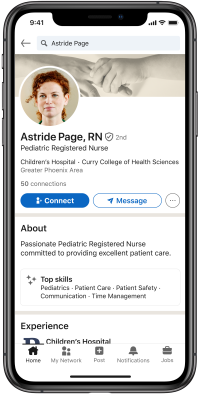Healthcare continues to be a hiring hotspot and LinkedIn aims to stay competitive as new staffing startups jump into the market.
The career-focused social media platform rolled out new features Tuesday to help healthcare professionals find their next job, reinforce their skills and grow their network.
Updates include customized job search filters to help nursing professionals fine-tune the results to better match their qualifications and preferences. Nurses can filter jobs by specialty, shift, schedule and license. Job seekers also can set their job preferences for each of these when turning on Open to Work on their Profile, signaling to recruiters what they're looking for in their next role.
More than half of hirers rely on skills to search for candidates. LinkedIn has now added more than 65 new nursing credentials and 35 new skills based on nursing specialty that professionals can add to their profile, from pediatrics and neonatal to hospice and palliative care to home health.

"For example, if you're an emergency room nurse, you could list a mix of hard and soft skills such as communication, problem-solving, critical and intensive care, IV therapy, collaboration and patient advocacy," by Rohan Rajiv, product manager at LinkedIn wrote in a blog post.
LinkedIn also is rolling out new tools and services to help nursing professionals grow their networks.
According to the company, healthcare companies leverage LinkedIn to share insights with professionals, citing a 30% rise in healthcare-related posts year-over-year.
"More than 3 million nurses in the U.S. are using LinkedIn to grow their careers: Every minute, two nurses apply for a job as they look to land their next opportunity," Rajiv wrote.
LinkedIn is stepping up its tools for nurses and healthcare professionals as the industry faces a critical nurse shortage. Nearly 100,000 registered nurses were estimated to have left the field during the COVID-19 pandemic and almost 800,000 intend to follow them out by 2027, according to a survey analysis released in April by the National Council of State Boards of Nursing (NCSBN).
In a survey of senior health system executives, 94 out of 100 leaders described their nursing shortage as “critical,” and just over two-thirds said they don’t have adequate nursing staff to handle a large-scale health crisis.
But many experts say the workforce crisis is the result of a shortage of "good" nursing positions.
There is a new crop of startups that aim to use technology to help hospitals fill staffing gaps. These hiring platforms have grown rapidly in the past few years and are attracting major funding from investors. In February, ShiftMed, a mobile app that connects healthcare workers and providers, clinched $200 million in fresh funding to fuel its growth. ShiftKey, a healthcare staffing technology company, scored $300 million in January, bringing its valuation to more than $2 billion.
According to Pitchbook, a sample list of 17 funded startups tied to the space collectively raised more than $700 million from June 2021 to June 2022.
As of June 2022, those companies, including Trusted Health, IntelyCare and Nomad Health, raised over $1.15 billion.
This summer, the Biden administration announced a $100 million investment to train more nurses and grow the workforce.